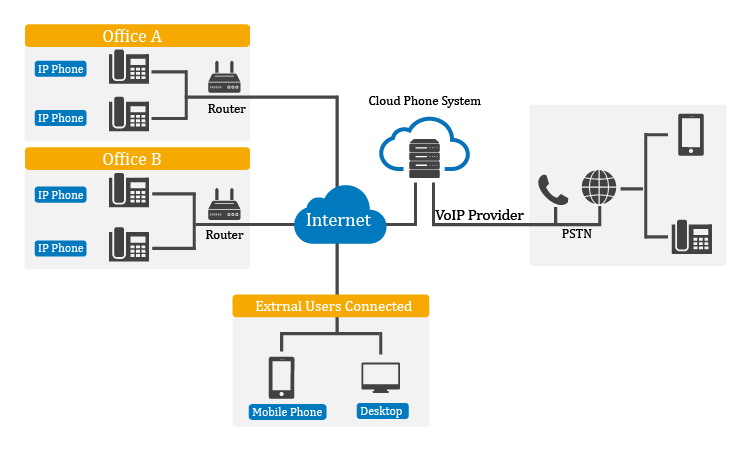Are you looking for a flexible and cost-efficient option to keep your business connected? If so, then you might want to consider switching to a cloud based phone system VoIP (Voice over Internet Protocol).
In this blog post, we’ll talk about few of the key features and benefits of cloud-based phone systems. We will also discuss some of the drawbacks of cloud-based phone systems too.
Editors Note: This blog post is last updated in August 2024.
Let's start with knowing what exactly a cloud-based phone system is with some examples.
What is a Cloud-Based Phone System?
In simple terms, a cloud-based phone system is a digital communication system which uses Voice over Internet Protocol (VoIP) and works through the internet.
| Related Blog: Cloud Telephony vs VoIP: What’s The Key Differences? |
The term "cloud based" refers to the fact that it's hosted remotely, on a vendor's servers also called ‘hosted telephony’.
Unlike the traditional on-premise phone system, the cloud-based system operates from the service provider's data centre, where they manage and maintain the infrastructure.

Some examples of cloud-based phone systems are:
- Gamma Horizon
- Zoom Video Communication
- Google Voice
- Ring Central
- Nextiva
- Freshworks
- Line2
- Dialpad
Key Features of a Cloud Based Phone System
The cloud-based phone system offers advanced features including call recording, call routing, auto attendant, and direct inward dialling (DID). Let’s discuss these cloud phone system features in detail:
1. Call Recording
Call recording is a valuable feature that is included in most cloud-based phone systems.
It allows you to capture and store conversations with your customers for later reference; but call recording is not just about keeping records.
These recordings can also be used to analyse customer interactions and identify areas for improvement in your company's communication strategy.
By reviewing these conversations, you can better understand your customers' needs and preferences, and tailor your approaches accordingly.
2. Call Routing
Call routing is also an important feature of any cloud-based phone system. With this feature, an incoming call is automatically directed to the appropriate department or individual based on predefined rules.
This means customers are quickly connected to the right person and their queries are addressed without any delay.
Additionally, call routing allows businesses to work more efficiently by streamlining their call flow and ensuring that employees are not bogged down with incoming calls that are not relevant to their role.
3. Auto Attendant
An auto attendant is a powerful feature of a cloud-based telephone system that allows callers to be connected to their desired party without the need for human intervention.
This technology offers a simple but efficient way of routing calls and reducing wait times, ultimately improving the customer experience while also increasing productivity.
Some of the excellent cloud-based phone system features that come with an auto attendant include custom greetings, call forwarding, and even voice recognition capabilities.
4. Direct Inward Dialling (DID)
DID allows customers to call a company without going through a receptionist or operator.
Instead, the call is routed directly to a specific extension. With cloud-based phone system features, businesses now have an added level of flexibility.
DID functionality can be easily programmed and rerouted in the cloud.
10 Key Benefits of Cloud Based Phone System (VoIP)
Here are the 10 benefits of cloud based phone system:
1. Cost Savings
One of the primary benefits of cloud-based phone system VoIP is cost savings. Because the system is hosted in the cloud, businesses no longer need to invest in expensive hardware and software.
Additionally, a cloud-based phone system VoIP eliminates the need for costly maintenance contracts and upgrades.
So, this makes it an ideal option for businesses that are looking to save money while still having access to reliable communication services.
2. Increased Flexibility
Another key benefits of cloud-based phone system VoIP are increased flexibility. With this type of system, businesses can easily add or remove users depending on their needs.
Also, this makes it easier for businesses to scale up or down as needed without having to invest in additional hardware or software.
Additionally, a cloud-based phone system VoIP allows users to access their phones from anywhere with an internet connection, making it easy for them to stay connected even when they’re away from their desks.
3. Improved Mobility
The next important benefit of cloud-based phone system VoIP is that it offers improved mobility compared to traditional landline systems.
With this type of system, employees can make and receive calls from any device that has an internet connection, including laptops, tablets, and smartphones.
This makes it easier for employees to stay connected while they’re on the go and can help improve productivity by allowing them to take calls wherever they are.
4. Better Quality Calls
A cloud-based phone system VoIP benefits better quality calls than traditional landline systems due to its advanced features such as call forwarding, voicemail transcription, and conference calling capabilities.
These features allow users to stay connected with customers and colleagues more efficiently than ever before while ensuring that each call is crystal clear with no static or dropped connections.
5. Automated Features
Cloud-based phone system VoIP offers a range of automated features that effectively streamline communication processes in a business setting.
In addition, these features include auto attendants and voicemail greetings, which efficiently direct incoming calls and ensure that customers receive prompt responses when they contact your business line.
6. Easy Setup & Maintenance
Other benefits of cloud-based phone system VoIP are its easy setup and maintenance process compared to traditional landline systems which require extensive setup time before they can be used effectively by employees within an organisation.
A cloud-based phone system VoIP offers a seamless setup experience, eliminating the need for businesses to navigate through complex installation processes or encounter technical difficulties during deployment.
With all the necessary components already integrated into the platform, businesses can quickly get up and running without any hassle, allowing them to focus on their core operations.
7. Improved Security
A major advantage of using a cloud- based phone system VoIP is improved security compared to traditional landline systems.
Cloud based solutions use encryption technology which helps keep customer data safe from cyberattacks, ensuring that confidential information always remains secure.
Additionally, these solutions offer additional layers of security such as authentication protocols which require users to enter unique passwords before they can access certain features, helping protect against unauthorised access attempts.
8. Scalability
Cloud-based solutions are highly scalable, meaning that businesses can easily increase or decrease their usage depending on their current needs without having significant impact on costs.
These benefits of cloud-based phone system make them ideal for businesses who experience fluctuating demand throughout the year as they do not have to commit to long term contracts in order to access additional resources when needed.
9. Integration Capabilities
Cloud based solutions are also capable of integrating with existing applications such as customer relationship management (CRM) software, allowing businesses better visibility into customer interactions across multiple channels which helps improve customer service experience overall.
Furthermore, these solutions also enable integration with other communication platforms such as instant messaging (IM) tools, providing users with more options when communicating with customers or colleagues remotely.
10. Enhanced Collaboration Features
Cloud-based solutions offer advanced collaboration features, including video conferencing capabilities, that enable teams dispersed across the globe to connect face-to-face without the need for extensive travel.
In addition, this allows for seamless discussions on projects and real-time brainstorming, fostering effective collaboration regardless of geographical barriers.
Moreover, these solutions are equipped with efficient file sharing capabilities that enable seamless document collaboration among team members, regardless of their physical location.
This not only accelerates workflow processes significantly but also eliminates the costly delays often associated with traditional manual document transfer methods.
Drawbacks of Cloud based Phone Systems
Here are the 4 potential drawbacks of cloud-based phone systems:
1. Disruption in service
One of the main drawbacks of using a cloud-based phone system VoIP is its reliability.
While VoIP systems are generally reliable, they can be prone to outages or other technical issues that can cause disruptions in service.
This can be especially problematic for businesses that rely on their phones to stay connected with customers and clients.
Additionally, if the internet connection goes down, then the VoIP system will not work at all.
2. Security Issues
Another potential drawback of cloud-based phone systems is security. While most VoIP providers use secure encryption protocols to protect customer data, there are still risks associated with using a cloud-based system.
For example, hackers may be able to access customer data if the provider’s security measures are not up to par.
Additionally, since the data is stored in the cloud, it could potentially be accessed by anyone with access to the provider’s network.
3. Quality Issues
The quality of a cloud-based phone system can also be an issue for some users.
The quality of calls made over a VoIP system depends on both the user’s internet connection and the provider’s network infrastructure. If either one of these is not up to par, then call quality may suffer as a result.
Additionally, some VoIP providers may compress audio signals in order to conserve bandwidth, which can lead to degraded sound quality as well.
4. Expensive Pricing
Finally, cost can also be an issue when it comes to cloud-based phone systems VoIP.
While some providers offer plans that are relatively affordable for small businesses and individuals, larger organisations may find that these plans become prohibitively expensive as their needs grow and they require more features or lines than what is offered in basic packages.
How Aztech Can Help?
Aztech can offer end-to-end UC solutions, including Skype for Business, to enhance collaboration and maximise productivity, and simple, pay-as-you-go hosted IP telephony services in the cloud offering all the functions and reliability of a traditional PBX, but with lower call costs and none of the complications.
We partner with the industry’s leading VoIP telephony providers, including Mitel, Gamma and BroadSoft, to deliver best of breed reliability, cost-efficiency and extended functionality.
So if you would like to discuss the business benefits that a hosted communications solution could bring to your business, please get in touch.

-1.png?width=552&height=678&name=text-image%20module%20desktop%20(4)-1.png)


.png?width=2000&name=Case%20study%20(21).png)


-2.png?width=422&height=591&name=text%20image%20tablet%20(31)-2.png)

-2.png?width=1366&height=768&name=Blog%20Hero%20Banners%20(4)-2.png)
-2.png?width=1366&height=768&name=Blog%20Hero%20Banners%20(5)-2.png)




